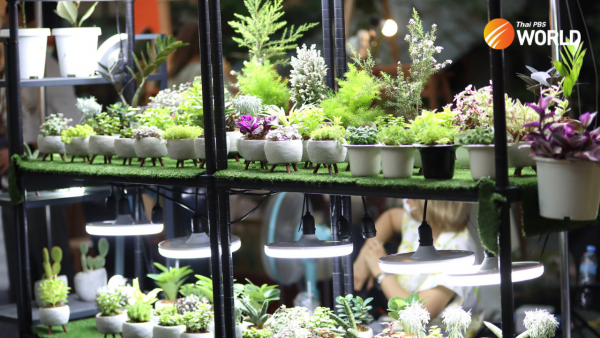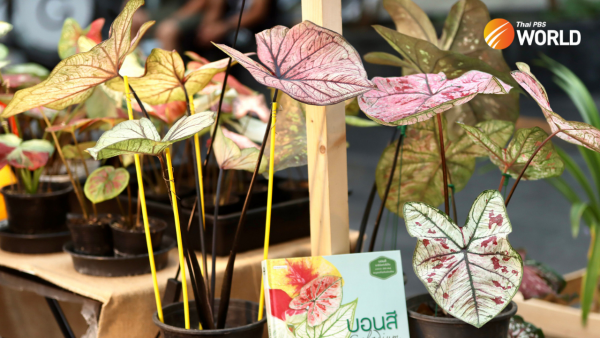Plants growers adapt to cope with sales in the new normal

Affected by rapid changes in interest both in gardening and houseplants, growers are turning their focus to exports and diversifying their activities in a bid to boost revenue.
Two years ago, the pandemic lifted the gardening and houseplant market to new heights but interest started to decline in November as people returned to their offices and the ‘new normal’ became, well, normal.
The rise and fall of houseplant trends
Rattana Wongrattanapong, 44, owner of Don Muang Variegated Plant Nursery, says his business has been affected by the recent changes and he’s switching to the global houseplant market, which has a higher potential for growth.
“During the Covid-induced isolation, people suddenly turned their attention to gardening and indoor plants. The demand for plants rose dramatically and so did the prices. But now the situation has changed and growers and sellers including us are feeling the pinch,” he says.
Prices have been dropping since November, but Rattana is confident that they won’t fall lower than pre-pandemic days.
He notes that the rise in popularity of gardening and indoor plants over the past two years can be explained not just by the Covid-19 pandemic but also by changing lifestyles, social media, and celebrity influencers like actress Urassaya Yaya Sperbund spurring demand and higher prices.

Cashing in but losing out
Meanwhile, staying home for a usually long period of time during the lockdowns encouraged both existing plant parents and novice gardeners to buy and grow plants in their homes. It also created a significant opportunity for growers to invest time and effort in introducing and promoting so-called ‘rare plants’ for sale.
Orchard owners and sellers have grown in parallel with buyers as increasing numbers of people started selling plants on online platforms such as Facebook and Instagram.
Warisa Savita Krongboonying, 33, recently started her online shop “Suan Meow” on Facebook [facebook.com/suan.meow/]. Warisa used to work for a low-cost airline but the pandemic knocked it out of business. Depression set in and the master-degree holder consulted a psychiatrist who recommended she try gardening.
“I enjoy gardening and it wasn’t long before I noticed that my plants were growing so fast that I was running out of room! I didn’t want to cut them or throw them away so I thought I would sell some of them. I post new plants twice a week and each time I sell around 10-12 of them.”
It’s been both a life-saver and a game-changer for Warisa who says she hopes to turn it into a real business.
But times are changing and with a vaccination rate of over 83% (two doses), people are going out more and many have resumed social activities.
“They have no time for their (plant) ‘babies’ so they are not going to bring new ones into their homes,” adds Rattana.
And just like fashion, plants also go through trends that push them in and out of style. Once the in-trend ones are propagated and then sold to serve the demand, the market becomes saturated and the prices drop significantly.
A couple of years ago, many gardeners were looking for unique and rare variegations to add to their collections. Philodendrons, monsteras, Alocasia, and Caladium were among the most popular plants and prices soared due to the high demand.
The increase in growers and the slow decline in interest has resulted in lots of plants but fewer people looking to buy them.
“Prices are based on supply and demand. Right now, supply is exceeding the demand. Seller has posted on their Facebook walls how disappointed they are in their sales,” says Rattana who has been in the plant business for more than 10 years.
Now that airlines have resumed flight operations, Rattana is shifting to exports to counter the decline in local demand.
“The customer base in the global market is bigger so there are more opportunities for growers,” he says.

Adjusting to a ‘new normal’
Krissana Rattanapat, 43, co-founder of Green Up Co Ltd has seen his sales drop by 20-30 % since November. His company operates vending machines that sell ornamental plants. Buyers can use their smartphones to get a plant from the machine. Founded in 2018, Green Up has 10 machines in leading department stores.
“We want to encourage people to grow more plants. The vending machine makes buying plants easy and convenient while creating a unique experience,” Krissana says.
The company also owns shops in the plant and flower market in Nonthaburi’s Bang Yai district. It has recently diversified into equipment and gardening supplies as well as auspicious plants.
When department stores closed during the lockdowns, Krissana moved their plants out of the stores and sold them through live streaming on social media platforms.
With businesses back up and running, Green Up has returned to the department stores but business is rather slow. “People are making fewer trips to department stores and shopping malls these days. I think they are adapting to a new normal. It takes time to get used to it,” he says.
Krissana notes the plant markets in some areas are quieter and sales are slow. A lot of space around the market is vacant, signaling the decline in interest.
“Most employees have returned to their offices. Yaya (the actress) is also getting back to acting. People spend less time on the internet,” he says.

Diversifying to spread risks
Attakorn Aiamchaorn, 29, co-founder of Montree Forest, is busy doing research to find out what kinds of plants and agricultural products are in high demand. He is considering adding a new activity to build greater resilience.
“We cannot just rely on one or two products if we want to keep our business running. Having many product lines help spread risk. When one source of revenue is affected by an event such as the current change in interest, we can depend on others,” he says.
Attakorn and his brother co-founded Montree Forest in 2018. Located in Ratchaburi’s Photharam district and spread over 5 rai, the plantation offers more than 50 species of seedlings and young plants including teak, Siamese rosewood, pine, mahogany, and Burma Padauk trees.
“Landowners are turning their deserted plots into gardens in order to take advantage of the country’s New Land and Building Tax Act. They buy seedlings and young plants from us. That’s amazing for our business,” he says.
In addition, the plantation supplies agricultural produce including pomelo and coconuts as well as gardening supplies. All products are mainly sold through websites, Facebook pages, and e-commerce platforms.
“We are making the most of our resources. We also sell dried leaves from our plants. They are used to make organic fertilizer,” Attakorn says.
He claims his plantation made over 3 million baht a month in sales during the lockdown. But that has dropped drastically as life returns to a new normal. He hopes that sales will make a comeback in the rainy season when plants bear fruit.
“We expect to sell more pomelos and coconuts when it rains,” he says.







